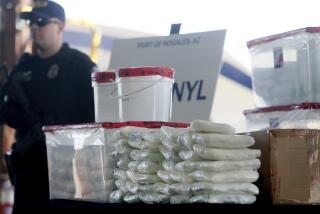Opening the Lines of Communication : Growing up: When discussing sex with their children, parents should take their cues from the kids, experts say. And do it sooner, not later.
- Share via
If you’re a parent who hasn’t uttered the s word in front of your kids . . . take a deep breath . . . and start somewhere.
Look for opportune moments, such as a plot involving sex on a TV show. Try watching an episode of “Beverly Hills, 90210” with your adolescent.
If your child is in a sex ed or health class at school, ask about the class.
“You can use this class to initiate conversation,” says Vicki Karlan, coordinator of health education for the Culver City Youth Health Center. “It sets a tone of education. And it’s non-threatening. It’s not out of the blue.”
And tell your children that far fewer kids are having sex than are making claims about it, says Lynn Posey, program director of the Coalition for Children, Adolescents and Parents in Orange: “A major problem for kids is that they don’t want sex but don’t know how to resist the pressure.”
Children can resist by simply walking away and avoiding the topic or by telling nosy friends that it’s none of their business, Posey says.
Passing on such advice does not have to be done in an intense, heavy discussion. You can discuss it over dinner, says Maria Juliani, a health expert who counsels families in the Division of Adolescent Medicine, Childrens Hospital of Los Angeles.
“I think parents need to do this in their own style of communication,” she says.
Try breaking the ice by asking a question, such as, “Do all your friends talk about who is having sex?”
Let your child know you empathize with how confusing it is to be an adolescent, Juliani says. Don’t judge.
“You can say, ‘I know you’ll be having new feelings about your body and being interested about sex.’ ”
Deborah, a nurse, believes that her profession has helped her communicate with her two sons, ages 17 and 13.
Yet even with her professional training, she finds she must take cues from her sons.
“Once in a while it comes up that he asks a question,” says Deborah, who lives in Culver City with her younger son. “I find if I bring it up, it’s not as well responded to.”
For example, Deborah, who spoke on the condition that she not be further identified, signed a consent form for her 13-year-old son to obtain condoms at the school health clinic if he requested them.
“He just said, ‘OK,’ ” Deborah recalls. “He listens more than anything.”
Deborah says she sometimes used her work counseling pregnant teen-agers as an entree to discuss sexually transmitted diseases and when is the right time to become sexually active.
“He tells me he has to have sex before he graduates from high school because it’s not socially acceptable not to have had sex by then,” she says. “He says everybody has sex before they graduate.
“What I have the hardest time with is when kids should start sex. I want them to delay it.”
Will he tell you when he does become sexually active?
“I’m not sure,” says Deborah. “I’m not sure if my older boy (is sexually active). He told me he has condoms. He told me not to worry about him, that he knew what to do. But he wouldn’t discuss it further with me.”
Michael, Deborah’s 13-year-old son, who did not want his real name used, says he is comfortable talking to his mom. But he says he doesn’t need her advice that much--yet.
“I don’t usually ask that many questions,” he says. “I don’t need to, because the school sex education course covers all the questions I need to know.”
But Michael clearly cherishes the fact that his mother is there to talk to him and help protect him.
“She told me, ‘If you are going to have sex, I put your name down at the school health clinic to get condoms.’ That makes me feel that she trusts me.”
He says his mom can answer just about anything concerning sex. But he’s a little uncertain if he’d tell her if he became sexually active.
“If I was going to have sex, I don’t know if I’d tell her,” he says. “I probably wouldn’t. Well, I probably would. I would say, ‘I’m going to have sex and can I have a condom?’ She’d get mad--but she wouldn’t stop me. She would say, ‘I want you to have the necessary precautions.’ ”
Says Deborah:
“I truly do promote abstinence. But I don’t think it’s for all kids to not have sex in their teen years. There will always be some who do.
“If my child decides not to follow my value system or cannot resist peer pressure, then I want him to feel that he can come to me for information and that his health is preserved.”
More to Read
Sign up for Essential California
The most important California stories and recommendations in your inbox every morning.
You may occasionally receive promotional content from the Los Angeles Times.










